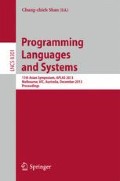Abstract
Verification by static analysis often hinges on the inference of relational numeric information. In real-world programs, the set of active variables is often not fixed for a given program point due to, for instance, heap-allocated cells or recursive function calls. For these program points, an invariant has to summarize values for traces E where a variable x exists and values for traces N where x does not exist. Non-relational domains solve this problem by copying all information on x in traces E to those in N. Relational domains face the challenge that the relations in traces E between x and other variables cannot simply be replicated for the traces N. This work illustrates this problem and proposes a general solution in form of a co-fibered abstract domain that forwards each domain operation to operations on a child domain. By tracking which variables are undefined, it transparently stores suitable values in the child domain thus minimizing the loss of relational information. We present applications in heap abstractions and function summaries.
This work was supported by DFG Emmy Noether programme SI 1579/1.
Access this chapter
Tax calculation will be finalised at checkout
Purchases are for personal use only
Preview
Unable to display preview. Download preview PDF.
References
Balakrishnan, G., Reps, T.: Recency-abstraction for heap-allocated storage. In: Yi, K. (ed.) SAS 2006. LNCS, vol. 4134, pp. 221–239. Springer, Heidelberg (2006)
Blanchet, B., Cousot, P., Cousot, R., Feret, J., Mauborgne, L., Miné, A., Monniaux, D., Rival, X.: A Static Analyzer for Large Safety-Critical Software. In: Programming Language Design and Implementation, San Diego, California, USA. ACM (June 2003)
Cousot, P., Cousot, R., Feret, J., Mauborgne, L., Miné, A., Monniaux, D., Rival, X.: Combination of Abstractions in the ASTRÉE Static Analyzer. In: Okada, M., Satoh, I. (eds.) ASIAN 2006. LNCS, vol. 4435, pp. 272–300. Springer, Heidelberg (2008)
Cousot, P., Halbwachs, N.: Automatic Discovery of Linear Constraints among Variables of a Program. In: Principles of Programming Languages, Tucson, Arizona, USA, pp. 84–97. ACM (January 1978)
Das, M., Lerner, S., Seigle, M.: ESP: Path-Sensitive Program Verification in Polynomial Time. ACM SIGPLAN Notices 37(5), 57 (2002)
Gulwani, S., McCloskey, B., Tiwari, A.: Lifting abstract interpreters to quantified logical domains. In: Principles of Progamming Languages, vol. 43, pp. 235–246. ACM (January 2008)
Reynolds, J.C.: Separation logic: A logic for shared mutable data structures. In: Logic in Computer Science, Copenhagen, Denmark, pp. 55–74. IEEE (2002)
Sagiv, M., Reps, T., Wilhelm, R.: Parametric Shape Analysis via 3-Valued Logic. Transactions on Programming Languages and Systems 24(3), 217–298 (2002)
Sepp, A., Mihaila, B., Simon, A.: Precise Static Analysis of Binaries by Extracting Relational Information. In: Pinzger, M., Poshyvanyk, D. (eds.) Working Conference on Reverse Engineering, Limerick, Ireland. IEEE (October 2011)
Siegel, H., Simon, A.: FESA: Fold- and expand-based shape analysis. In: Jhala, R., De Bosschere, K. (eds.) Compiler Construction. LNCS, vol. 7791, pp. 82–101. Springer, Heidelberg (2013)
Venet, A.: Abstract Cofibered Domains: Application to the Alias Analysis of Untyped Programs. In: Cousot, R., Schmidt, D.A. (eds.) SAS 1996. LNCS, vol. 1145, pp. 366–382. Springer, Heidelberg (1996)
Author information
Authors and Affiliations
Editor information
Editors and Affiliations
Rights and permissions
Copyright information
© 2013 Springer International Publishing Switzerland
About this paper
Cite this paper
Siegel, H., Mihaila, B., Simon, A. (2013). The Undefined Domain: Precise Relational Information for Entities That Do Not Exist. In: Shan, Cc. (eds) Programming Languages and Systems. APLAS 2013. Lecture Notes in Computer Science, vol 8301. Springer, Cham. https://doi.org/10.1007/978-3-319-03542-0_6
Download citation
DOI: https://doi.org/10.1007/978-3-319-03542-0_6
Publisher Name: Springer, Cham
Print ISBN: 978-3-319-03541-3
Online ISBN: 978-3-319-03542-0
eBook Packages: Computer ScienceComputer Science (R0)

